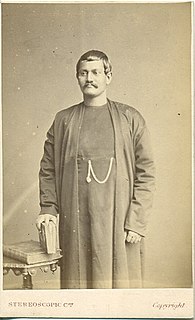A Quote by Barrows Dunham
When you want to organize knowledge. you will be careful to base the classification upon essential qualities. You will thus derive classes in which the members have the greatest amount of resemblance to one another and the greatest amount of difference from the members of other classes. But suppose that, instead of organizing knowledge, you set out to organize ignorance and prejudice. You will then do precisely the opposite.You will keep the classification vague and flexible, so that it can be made to include just whatever individuals you choose.
Quote Topics
Amount
Another
Base
Be Careful
Careful
Choose
Classes
Classification
Derive
Difference
Essential
Flexible
Greatest
Ignorance
Ignorance And Prejudice
Include
Individuals
Instead
Just
Keep
Knowledge
Made
Members
Opposite
Organize
Organizing
Other
Out
Precisely
Prejudice
Qualities
Resemblance
Set
Suppose
Then
Thus
Vague
Want
Whatever
Which
Will
You Choose
Related Quotes
So the problem in the West is that, especially in places like the USA, a person will obtain this much knowledge and immediately think that they have a large amount of knowledge. And then start to act on the basis of what they think, they posses. Instead of having this much knowledge and realizing that in fact this is only this much knowledge and the amount of where you can go there is where you came is much bigger than where you've already gotten.
But progress in knowledge has made us aware of the superficiality of Plato's lumping of individuals and their original powers into a few sharply marked-off classes; it has taught us that original capacities are indefinitely numerous and variable. It is but the other side of this fact to say that in the degree in which society has become democratic, social organization means utilization of the specific and variable qualities of individuals, not stratification by classes.
The ends of scientific classification are best answered, when the objects are formed into groups respecting which a greater number of general propositions can be made, and those propositions more important, than could be made respecting any other groups into which the same things could be distributed. ... A classification thus formed is properly scientific or philosophical, and is commonly called a Natural, in contradistinction to a Technical or Artificial, classification or arrangement.
The best-informed man is not necessarily the wisest. Indeed there is a danger that precisely in the multiplicity of his knowledge he will lose sight of what is essential. But on the other hand, knowledge of an apparently trivial detail quite often makes it possible to see into the depth of things. And so the wise man will seek to acquire the best possible knowledge about events, but always without becoming dependent upon this knowledge. To recognize the significant in the factual is wisdom.
It is therefore, the interest of all, that every one, from birth, should be well educated, physically and mentally, that society may be improved in its character, - that everyone should be beneficially employed, physically and mentally, that the greatest amount of wealth may be created, and knowledge attained, - that everyone should be placed in the midst of those external circumstances that will produce the greatest number of pleasurable sensations, through the longest life, that man may be made truly intelligent, moral and happy, and be thus prepared to enter upon the coming Millennium.
We have heard of a Society for the Diffusion of Useful Knowledge. It is said that knowledge is power, and the like. Methinks there is equal need of a Society for the Diffusion of Useful Ignorance, what we will call Beautiful Knowledge, a knowledge useful in a higher sense: for what is most of our boasted so-called knowledge but a conceit that we know something, which robs us of the advantage of our actual ignorance? What we call knowledge is often our positive ignorance; ignorance our negative knowledge.
The education that you give to the upper classes will not uproot idolatry and prejudice, for it is amongst the masses that the error and prejudice will always maintain their power, and while you do not uproot those prejudices from the hearts of the masses, a handful of educated Hindus will never be able successfully to reform the country.
In however complex a manner this feeling may have originated, as it is one of high importance to all those animals which aid and defend one another, it will have been increased through natural selection; for those communities, which included the greatest number of the most sympathetic members, would flourish best, and rear the greatest number of offspring.
God Himself - His thoughts, His will, His love, His judgments are men's home. To think His thoughts, to choose His will, to judge His judgments, and thus to know that He is in us, with us, is to be at home. And to pass through the valley of the shadow of death is the way home, but only thus, that as all changes have hitherto led us nearer to this home, the knowledge of God, so this greatest of all outward changes - for it is but an outward change - will surely usher us into a region where there will be fresh possibilities of drawing nigh in heart, soul, and mind to the Father of us all.
For life is a fire burning along a piece of string--or is it a fuse to a powder keg which we call God?--and the string is what we don't know, our Ignorance, and the trail of ash, which, if a gust of wind does not come, keeps the structure of the string, is History, man's Knowledge, but it is dead, and when the fire has burned up all the string, then man's Knowledge will be equal to God's Knowledge and there won't be any fire, which is Life. Or if the string leads to a powder keg, then there will be a terrific blast of fire, and even the trail of ash will be blown completely away.
One of the greatest distinguishing marks of false prophet is that he will always tell you what you want to hear, he will never rain on your parade; he will get you clapping, he will get you jumping, he will make you dizzy, he will keep you entertained, and he will present a Christianity to you that will make your church look like a six flags over Jesus.
Be careful how you do one man a pleasure which must needs occasion equal displeasure in another. For he who is thus slighted will not forget, but will think the offence to himself the greater in that another profits by it; while he who receives the pleasure will either not remember it, or will consider the favour done him less than it really was.


































